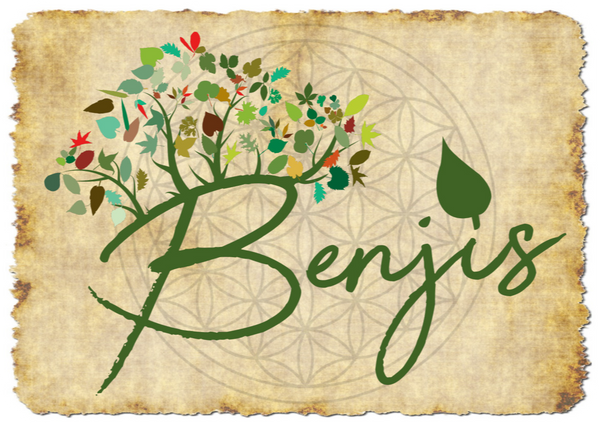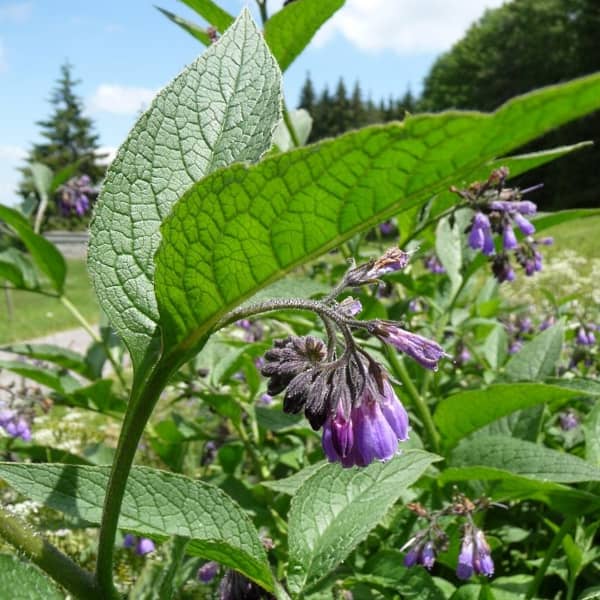Benjis seeds
Comfrey [Symphytum officinale]
Comfrey [Symphytum officinale]
Couldn't load pickup availability
Tips to reduce water requirements
Tips to reduce water requirements
We recommend mulching the beds
Experience has shown that by covering the ground, e.g. with Hay or straw, which can reduce evaporation by 80%. If you keep the beds evenly moist, an optimal moist microclimate will be created under the mulch. This not only promotes the growth of the plants, but also reduces water consumption enormously.
It is also recommended to always keep the beds moist , even if the bed is not used for a certain period of time
The drying out of the soil leads to a huge decline in the micro- and macro-organisms in the soil, which over time leads to an infertile soil . Tests have shown that the water content in the entire bed remains longer when the entire bed is watered over a longer period of time than when it is only watered selectively. Due to the small volume of the poured areas in contrast to the large dry volume, they dry out more quickly than if the entire volume of the bed is filled with moisture. Similar to heating in an apartment.
If the beds are not in use, we recommend sowing with green manure.
Maintaining an energy level always requires less energy than having to reach it again and again.
Shipping and pick-up information
Shipping and pick-up information
Shipping
We offer CTT shipping for Saagut Europe and USA far! With us you will always receive a tracking number to track your package. Shipping costs differ depending on the shipping region. Here is a list of regions and prices:
National Shipping
Portugal (with the Azores and Madeira Islands)
Envelope or package up to 500g = € 3.50
2 kg Bus Package = 8 €
Package over 2 kg = 16 €
Europe Shipping
Envelope up to 100g = 7 €
500g Bus Package = 9,50 €
1kg Bus Package = 14 €
2kg Bus Package = 20 €
Package over 2kg = 40 €
USA Shipping
Envelope up to 100g = € 7.50
500g Bus Package = 15,50 €
1 kg Bus Package = 24 €
2 kg Bus Package = 33,50 €
Package over 2 kg = 67 €
After you have completed your order with payment, you will receive a shipping confirmation email with your tracking number.
Abholung
You can pick up your order at any time from 12 noon to 8 pm or by appointment with us on site or at the markets we visit.
Simply enter the desired market to pick up in the comment box in the shopping cart.
You can find the markets in the menu on our website or at this link: https://www.benjis.net/pages/market-dates
Comfrey is an ancient perennial tea, fertilizer and medicinal plant that has been known since ancient times and is widespread in Europe, North Africa and Western and Central Asia. The species occurs wild in Europe, mainly in moist locations such as meadows, stream edges and ditches. The strong and resilient perennial develops crimson to light purple flowers that make excellent bee pasture. The strong runner-forming rhizomes are used as medicine and help externally to heal wounds and to relieve bone fractures, tendonitis and swelling. Manure from the plant is an excellent nitrogen, phosphorus and potassium fertilizer and strengthens the resistance of plants to pests and fungal diseases.
General information
Plant family: Boraginaceae
Life cycle: Perennial
Days to harvest: 100 days
Plant height approx.: 100 cm
Root type: Deep rooter, runner forming
Nutrient requirements: Medium eater
Water requirements: Medium
Winter hardiness: Up to -30 °C
Location: Sunny until semi shady
Soil: Permeable, moist, moist, slightly loamy, humus
pH value: 6.5 to 7.5
Sowing and planting information
Germ type: Dark and cold germinator
Sowing depth: 1 cm
Optimal germination temperature: 3-5 °C
Germination time: 20-30 days
Plant and row spacing: 50x50 cm
Optimal mixed culture:
Unfavorable mixed culture:
Subtropic climate (Mediterranean) (e. g. B. Portugal, Spain, Italy)
Sow directly outdoors from November to January or pre-cultivate in small pots from January to April with artificial stratification.
Moderate climate (e. g. B. Germany, Switzerland, Poland)
Sow directly outdoors from March to May or in autumn from October to November or pre-cultivate in small pots from February to May or in autumn from September to November.
General
The germination of the seeds is naturally irregular and requires exposure to cold at 0°C for 5-6 weeks. Alternatively, artificial stratification in the refrigerator is possible. Sow directly in rows. When pre-cultivating, sow the seeds in small pots and let the seedlings grow to the first visible comfrey leaves. Then plant the pregrown plants from the pots directly into the open field. The seedlings are planted in the bed from the 2nd pair of leaves after the cotyledons.
Comfrey prefers a sunny to partially shaded location with moist, well-drained, humus-rich and sandy loam soil. Prepare the soil with seasoned animal manure. Avoid waterlogging.
Additional tips
A partially shaded location is advisable if there is little water supply. In full sun it only thrives on extremely moist to wet soils. In order to quickly obtain a fine, crumbly and permeable soil, we recommend additional incorporation of biochar and primary rock powder.
Type of propagation
It spreads via seeds or through root division.
Plant care
After the first frosts in late autumn, it is advisable to prune the plant so that it sprouts more vigorously next year and prevents uncontrolled spread by seeds. Regular watering results in more stable growth. Beds prepared with animal manure and planting in mixed culture replace additional fertilizer.
Germination ability of seeds: 1-2 years
Other Names
Botanical names: Symphytum officinale
English names: Comfrey, Common comfrey, True comfrey
German names: Beinwell, Beinheil, Beinwurz, Echter Beinwell, Bienenkraut, Wundallheil, Eselohrwurz, Milchwurz, Schadheilwurz, Wallwurz
Portuguese names: Confrei, Consolda
Spanish names: Consuelda
French names: Consoude, Confée, la consoude
- Made in harmony with nature
- All seeds and seedlings are genetically stable for further propagation
- Our seeds are always checked for germination at regular intervals
Share
![Comfrey [Symphytum officinale]](http://www.benjis.net/cdn/shop/files/Beinwell-Comfrey-Confrei-Symphytumofficinale-www.benjis.net.jpg?v=1710463504&width=1445)



